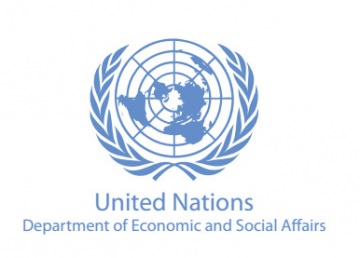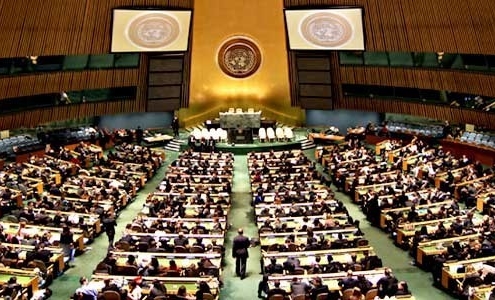The Office of the Special Adviser on Africa (OSAA) was officially established on 1 March 2003 by the Secretary-General Bulletin (ST/SGB/2003/6) , in line with General Assembly Resolution A/RES/57/7 of 4 November 2002 and became operational on 1 May 2003. OSAA’s role was subsequently expanded in resolution 66/293 adopted by the General Assembly on 15 October 2012, which mandated the Office to establish a monitoring mechanism to review commitments made towards Africa’s development.
http://www.unmultimedia.org/avlibrary/asset/1735/1735931/
Above is at the High-level event on “Strengthening Partnerships for Inclusive Sustainable Development, Good Governance, Peace and Stability in Africa”, on the occasion of Africa Week. Queen Mother is at 2Hr 32 Min
In accordance with the above resolution, OSAA was initially mandated to:
- enhance international support for Africa’s development and security through its advocacy andanalytical work,
- assist the Secretary-General in improving coherence and coordination of the UN System support to Africa, and
- facilitate inter-governmental deliberations on Africa at the global level, in particular relating to the New Partnership for Africa’s Development (NEPAD).
In implementation of its mandate, OSAA:
- supports the General Assembly and the Economic and Social Council in their deliberations on Africa;
- coordinates and guide the preparation of Africa-related reports and inputs, in particular support forNEPAD by the United Nations System and the international community, including the private sector andcivil society;
- coordinates the Interdepartmental Task Force on African Affairs (IDTFA), to ensure a coherent and integrated approach for United Nations support for Africa, including following up on the implementation of all global summit and conference outcomes related to Africa;
- initiates reports on critical issues affecting Africa, and in particular on the interrelated issues of peace and development;
- coordinates global advocacy in support of NEPAD, and;
- acts as the focal point for NEPAD within the United Nations Secretariat at Headquarters.
Mr. Maged Abdelfatah Abdelaziz, Current Under-Secretary-General and Special Adviser on Africa

Under-Secretary-General Abdelaziz was appointed by the Secretary-General by United Nations Secretary-General, Ban Ki-moon, on 8 March 2012, and took up office on Thursday 17 May of the same year. He brings to the position more than 33 years of experience in multilateral diplomacy, a direct engagement in promoting global peace, security and development.
Prior to his appointment, Mr. Abdelaziz had been serving as Permanent Representative of Egypt to the United Nations in New York, since 2005. In that capacity, he co-chaired in 2008 the Review Conference on Financing for Development and, in 2009, he was the Rapporteur, representing Africa, at the Conference on the Economic and Financial Crisis and Its Impact on Development.
Having served as Vice President of the Economic and Social Council (2011-12) and Vice President of the United Nations General Assembly (2008-2009), Mr. Abdelaziz enjoys an intimate knowledge of the UN intergovernmental processes and multilateral diplomacy. Pursuant to General Assembly Resolution 65/289 to consider rates of reimbursement to troop contributing countries and related issues, he also served as a member of the Secretary-General’s Senior Advisory Group. As Chair of the Coordinating Bureau of the Non-Aligned Movement since 2009, he chaired the High Officials’ meeting of the 15th Summit of the Non-Aligned Movement (NAM) held in Sharm El Sheik (Egypt) in July 2009.
As Deputy Permanent Representative of Egypt to the United Nations (1997-99) he was the principal officer in charge of all the questions relating to disarmament. During that period, he served as the Chair of the United Nations Disarmament Commission which negotiated and adopted the United Nations guidelines for the establishment of Nuclear Weapons-free Zones. He was a member of the Egyptian delegation to the Security Council during Egypt’s membership of the council in (1984-85) and (1995-97).
Mr. Abdelaziz played a leading role in the establishment of the Human Rights Council and the Peace-Building Commission as well as the elaboration and adoption of the United Nations Global Counter Terrorism Strategy. He also played an active role in enhancing the United Nations’ role in development, with particular emphasis on the achievement of the internationally agreed development goals, including the Millennium Development Goals (MDGs) and enhancing the global response to the special needs of Africa, the Least Developed Countries and the Small Islands Developing States.
His focus was on revitalizing the entire agenda relating to the special needs of Africa, including through implementation of the New Partnership for Africa’s Development (NEPAD) to which the Secretary-General attaches the highest priority.
Mr. Abdelaziz graduated from the Ain Shams University School of Law in 1973. He is married and father of one daughter.
Established by the Economic and Social Council (ECOSOC) of the United Nations (UN) in 1958 as one of the UN’s five regional commissions, ECA’s mandate is to promote the economic and social development of its member States, foster intra-regional integration, and promote international cooperation for Africa’s development.
Made up of 54 member States, and playing a dual role as a regional arm of the UN and as a key component of the African institutional landscape, ECA is well positioned to make unique contributions to address the Continent’s development challenges.
ECA’s strength derives from its role as the only UN agency mandated to operate at the regional and subregional levels to harness resources and bring them to bear on Africa’s priorities. To enhance its impact, ECA places a special focus on collecting up to date and original regional statistics in order to ground its policy research and advocacy on clear objective evidence; promoting policy consensus; providing meaningful capacity development; and providing advisory services in key thematic fields.
ECA’s thematic areas of focus are as follows:
- Regional Integration and Trade
- Social Development
- Natural Resources
- Innovation and Technology
- Gender
- Governance
ECA also provides technical advisory services to African governments, intergovernmental organizations and institutions. In addition, it formulates and promotes development assistance programmes and acts as the executing agency for relevant operational projects.
Specialized regional advisory services and meaningful capacity development support to member States is provided in the following priority areas:
- Promotion of industrialization
- Design and implementation of macroeconomic policy
- Design and articulation of development planning
- Supporting mineral resources contract negotiations
- Promoting the proper management of natural resources for Africa’s transformation
ECA is headed by an Executive Secretary, who is assisted by two Deputy Executive Secretaries. Its work programme is supported by two pillars: knowledge generation and knowledge delivery. There are five substantive divisions responsible for policy research: Macroeconomic Policy, Regional Integration & Trade, Social Policy Development, Special Initiatives, and the African Centre for Statistics. The Capacity Development Division, IDEP (ECA’s training arm), the Division of Administration and ECA’s Subregional Offices in Rabat, Niamey, Yaounde, Kigali and Lusaka comprise the knowledge delivery pillar. Knowledge generation and knowledge delivery at the ECA are underpinned by the Strategic Planning & Operational Quality Division and the Public Information and Knowledge Management Division. The ECA Partnerships Office and the Joint Secretariat Support Office of the ECA, African Union Commission and African Development Bank complement the work of the substantive divisions.
ECA’s policy work aims to shape Africa’s transformation by supporting a growth path which addresses the vulnerabilities that impact on people’s lives.

The United Nations Department of Economic and Social Affairs (UN DESA) is part of the United Nations Secretariat and is responsible for the follow-up to the major United Nations Summits and Conferences, as well as services to the United Nations Economic and Social Council and the Second and Third Committees of the United Nations General Assembly.
UN DESA assists countries around the world in agenda-setting and decision-making with the goal of meeting their economic, social and environmental challenges. It promotes and supports international cooperation to promote development for all. In providing a broad range of analytical products, policy advice, and technical assistance, UN DESA effectively translates global commitments in the economic, social and environmental spheres into national policies and actions and continues to play a key role in monitoring progress towards internationally agreed-upon development goals.
Due to the importance the United Nations attaches to economic and social affairs, the Department contains several important Divisions. These include the Development Policy Division, the Financing for Development Office, the Division for Sustainable Development, the Division for Social Development, the Division for Public Administration, the Statistics Division, and the Population Division. It is also a member of the United Nations Development Group.
UN DESA works in three main interlinked areas:
- it compiles, generates and analyzes a wide range of economic, social and environmental data and information on which States Members of the United Nations draw to review common problems and to take stock of policy options;
- it facilitates the negotiations of Member States in many intergovernmental bodies on joint courses of action to address ongoing or emerging global challenges;
- it advises interested Governments on the ways and means of translating policy frameworks developed in United Nations conferences and summits into programmes at the country level and, through technical assistance, helps build national capacities.
In 2002, due to the increased burden of servicing an increasing number of conferences including the Millennium Declaration, the Department was expanded and gained a new office of an Assistant Secretary-General. UNDESA is headquartered in New York, but has an important secondary office in Rome (Italy), managing the coordination of Italian Fellowship and JPO Programmes.
- 2017 Kwanzaa Accords Review
- 2018 Kwanzaa Accords Review
- 2018 MLK Day
- 2019 Black History Month
- 2019 Kwanzaa Accords Review
- 2019 MLK Day
- 3rd GA
- 400 Year Commemoration
- 400 Year Commemoration Act
- 45 POTUS
- AA Corporate Board Members
- AA County Commissioners
- AA County Commissioners
- AA Politicians
- AA Women
- AA Women
- Access to Capital Institute
- Africa
- Africa
- Africa
- Africa Industrialization Day 2017
- Africa Week 2017
- African American
- African CSO’s
- African Development Bank
- African Diaspora Directorate
- African Liberation
- African Liberation Day
- African Liberation Day
- African Studies
- African Union
- African Union 30th
- African Union Mission to USA
- African Unity Solutions
- All Africa People’s Conference
- Ambassador Arikana Chihombori-Quao
- Assistant Secretary
- AU and the EU
- AU and the UN
- AU Sixth Region
- Bail Bonds
- Black History Month
- Border Security
- Brookings
- Brookings Africa Growth Initiative
- Brookings Africa Growth Initiative
- Brown Capital Management Africa Forum
- Bureau of African Affairs
- Business Capital
- Business Loans
- C.A.S.H.
- CBC
- Celebrations
- Chairman
- Cincinnati
- Cincinnati City Council
- Civil Society
- Civilian Oversight of Law Enforcement Association
- Colleges & Universities
- Committee on Non-Governmental Organizations
- Community Benefit Agreement
- Community Development
- Community Reinvestment
- Congressional Black Caucus
- COPS
- Corruption
- COVID19
- COVID19
- COVID19
- Croson Study
- Cryptocurrency
- Daniels IDIQ
- Decade of the People of African Descent
- Dept. of Agriculture
- Dept. of Education
- Development Bonds
- Diversity
- DOJ
- Economic Commission for Africa (ECA)
- ECOSOC
- ECOSOCC
- Education
- Executive Office of the President
- Executive Orders
- Experts on People of African Descent
- FAU Agency
- FAU Alabama Assembly
- FAU Baltimore
- FAU Bureau
- FAU CBA Requests
- FAU Chapters
- FAU Cincinnati
- FAU England
- FAU eSwatini
- FAU Fort Coffee
- FAU Guinea
- FAU Human Rights Dept.
- FAU Joint Ventures
- FAU Maryland Assembly
- FAU Oklahoma Assembly
- FAU Organization
- FAU San Diego
- FAU South Sudan
- FAU USA
- FAU Women
- FAUchamber
- Fifth Third Bank $30B CBA
- Firsts
- Fort Coffee
- Global Network for Africa’s Prosperity
- HBCU
- HBCU
- Health
- Holidays
- HUD
- Hughes Hubbard & Reed
- Human Rights Council
- Illegal Immigration
- Illegal Population
- Inclusion
- International Days
- International Holocaust Remembrance Day
- International Human Rights Day
- Juneteenth
- Kwanzaa
- Kwanzaa Accords Review
- Leadership
- Members
- MLK Day
- MLK Day
- Mortgages
- NABVETS
- National Security Strategy of the United States of America
- NCRC CBA
- NEPAD
- New Markets Tax Credits
- Office of Domestic Policy
- Office of the Special Adviser on Africa
- Office of the Special Adviser on Africa
- Ohio
- Ohio State
- Pan African Congresses
- Petition for US Gov
- Philanthropy
- POTUS 44
- POTUS 45
- POTUS and Africa
- Power Africa
- Press Release
- Public Benefit Company
- Public Private Partnership
- Qualified Subcontracts
- Reparations
- Rwanda
- Secretary-General
- Senegal
- Sewers
- Sickle Cell
- Slavery
- Smart Communities
- Speaker Pelosi
- Stanford University’s Center for African Studies
- Statements
- The Assembly
- The National Security Council (NSC)
- The President’s Advisory Council on Doing Business in Africa
- The President’s Advisory Council on Doing Business in Africa
- Tibor P. Nagy
- Tom Steyer
- UN Department of Public Information (UNDPI)
- Uncategorized
- Under Secretary-General (USG) Special Adviser on Africa.
- United Nations
- United Nations (UN)
- United Nations Industrial Development Organization
- Universal Declaration of Human Rights
- Universal Declaration of Human Rights
- UNUPR
- US African Policy
- US Congress
- US Congress
- US Government
- US House
- US Justice
- USA
- USA Africa
- USA NGO’s
- USAID
- Veterans
- Wells Fargo Bank
- White House Initiative on HBCU’s
- White House Opportunity and Revitalization Council
- White House Opportunity and Revitalization Council
- Wilson Center Africa Program
- World Economic Forum
- World Sickle Cell Day
- World Sickle Cell Day
Archives
- July 2020
- June 2020
- May 2020
- April 2020
- March 2020
- February 2020
- January 2020
- December 2019
- October 2019
- September 2019
- August 2019
- July 2019
- June 2019
- May 2019
- March 2019
- February 2019
- January 2019
- December 2018
- November 2018
- September 2018
- February 2018
- January 2018
- December 2017
- November 2017
- October 2017
- September 2017
- August 2017
- July 2017
- June 2017
- May 2017
- April 2017
- March 2017
- February 2017
- January 2017
- December 2016
- November 2016
- October 2016
- September 2016
- May 2016
- December 2015
- April 2015
How Does The WHITEHALL’S COVID-19
Clean System Work?
DISINFECTION
Disinfect, clean, sanitize and deodorize premises
PROTECTION
After surfaces are thoroughly cleaned & disinfected, apply antimicrobial protection
CERTIFY
This certification will let others know that the property/facility has been cleaned with the most reliable technology on the market
Covid-19 Disinfection Services
Our commitment to excellent service, our Covid-19 Cleaning and Disinfecting Services includes but not limited to the following:
- Disinfecting Services
- Sanitizing Services
- Deep Clean/Impact Cleans
- High Touch Point Area focus
- Color-coded microfibers






